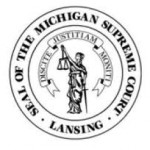 Elba Township brought an action against the Gratiot County Drain Commissioner seeking to enjoin the commissioner from consolidating the drainage districts associated with the No. 181-0 drain and its tributary drains. Elba Township argued that the consolidation proceedings had violated the Drain Code because the No. 181-0 drain petition for consolidation lacked the statutorily required number of freeholder signatures and the notice of the hearing by the board of determination had been deficient. Plaintiffs David Osborn, Mark Crumbaugh, Cloyd Cordray, and Rita Cordray intervened, similarly seeking declaratory and injunctive relief and claiming that the petition was defective and that the notice of the meeting of the board of determination was defective, resulting in a violation of their due process rights. With regard to the due process claim, plaintiffs’ primary complaint was that some of the property that would be affected by the drainage project lay outside the townships listed in the notice, although the notice stated that it was being sent to persons liable for an assessment. The drain commissioner moved for summary judgment, arguing that the appropriate number of signatures had been gathered and that the notice given appropriately informed those affected by the proposed consolidation of the date, time, and place of the board-of-determination hearing. Elba Township and plaintiffs filed cross-motions for summary judgment. The court granted the drain commissioner’s motion, finding that only 5 freeholder signatures were required on the petition rather than the 50 signatures the township claimed. Elba Township and the Osborn plaintiffs appealed. The Court of Appeals affirmed the trial court’s exercise of equitable jurisdiction, but reversed on the merits. Upon review, the Supreme Court concluded that the lower courts improperly exercised equitable jurisdiction over the signature-requirement question but properly exercised such jurisdiction over the question of notice. “The former question is purely statutory and, as such, there were no grounds on which the lower courts could properly exercise equitable jurisdiction. Though the exercise of equitable jurisdiction over the latter question was proper, we conclude that constitutional due process did not entitle plaintiffs to receive notice of the ‘board of determination’ hearing. The trial court’s order granting summary judgment for defendant was reinstated.
Elba Township brought an action against the Gratiot County Drain Commissioner seeking to enjoin the commissioner from consolidating the drainage districts associated with the No. 181-0 drain and its tributary drains. Elba Township argued that the consolidation proceedings had violated the Drain Code because the No. 181-0 drain petition for consolidation lacked the statutorily required number of freeholder signatures and the notice of the hearing by the board of determination had been deficient. Plaintiffs David Osborn, Mark Crumbaugh, Cloyd Cordray, and Rita Cordray intervened, similarly seeking declaratory and injunctive relief and claiming that the petition was defective and that the notice of the meeting of the board of determination was defective, resulting in a violation of their due process rights. With regard to the due process claim, plaintiffs’ primary complaint was that some of the property that would be affected by the drainage project lay outside the townships listed in the notice, although the notice stated that it was being sent to persons liable for an assessment. The drain commissioner moved for summary judgment, arguing that the appropriate number of signatures had been gathered and that the notice given appropriately informed those affected by the proposed consolidation of the date, time, and place of the board-of-determination hearing. Elba Township and plaintiffs filed cross-motions for summary judgment. The court granted the drain commissioner’s motion, finding that only 5 freeholder signatures were required on the petition rather than the 50 signatures the township claimed. Elba Township and the Osborn plaintiffs appealed. The Court of Appeals affirmed the trial court’s exercise of equitable jurisdiction, but reversed on the merits. Upon review, the Supreme Court concluded that the lower courts improperly exercised equitable jurisdiction over the signature-requirement question but properly exercised such jurisdiction over the question of notice. “The former question is purely statutory and, as such, there were no grounds on which the lower courts could properly exercise equitable jurisdiction. Though the exercise of equitable jurisdiction over the latter question was proper, we conclude that constitutional due process did not entitle plaintiffs to receive notice of the ‘board of determination’ hearing. The trial court’s order granting summary judgment for defendant was reinstated.
Elba Township v. Gratiot County Drain Commissioner
April 22, 2013 by Leave a Comment
Speak Your Mind
You must be logged in to post a comment.